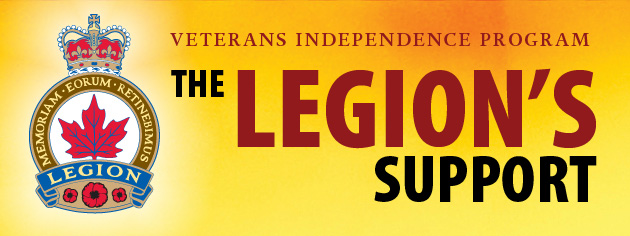
The Veterans Independence Program (VIP) has changed a lot since its introduction in 1981—and The Royal Canadian Legion has been there every step of the way.
The program was implemented to help Veterans Affairs Canada handle a looming crisis in availability of long-term care beds due to aging of war service veterans. At the time, options were limited for seniors unable to live independently, and there was great reliance on long-term care facilities. “There was a concern in the late 1970s that in the absence of an alternative, the Second World War veteran was literally going to swamp the system of priority access beds,” explains Darragh Mogan, VAC’s director general, program and service policy division in Charlottetown. VIP was developed to help eligible veterans remain in their own homes, delaying, perhaps preventing, institutionalization.
“We (the Legion) were telling the government there were going to be problems with long-term care beds even before the VIP was thought of,” explains Pierre Allard, Director of The Royal Canadian Legion’s Dominion Command Service Bureau.
Originally targeted at war disability pensioners, the Aging Veterans Program was renamed the Veterans Independence Program in 1984, and over the years benefits were extended to include veterans receiving disability pensions, low-income veterans, Canada Service Veterans, special duty area pensions, and merchant navy veterans and some civilian groups.
In 1990, housekeeping and groundskeeping benefits were extended to veterans’ survivors for one year following the death of a veteran who had been receiving benefits. In 2003, this was expanded to a lifetime benefit. In 2008, $282 million was earmarked to extend benefits to widows or caregivers who receive Revenue Canada’s disability tax credit and/or the Guaranteed Income Supplement.
Over the years services covered have also expanded to include ambulatory health care, home adaptations and in-home treatments. “The Legion has been involved and consulted on every change to the VIP,” says Allard. “Every step of the way we’ve been advocating, first for introduction of VIP and then for improvements to VIP.”
Efforts continue even today—delegates to the 2008 dominion convention passed 10 resolutions calling for improvements to the VIP, from simplifying eligibility and application criteria, to extending benefits to frail veterans, Allied veterans, RCMP members and widows and caregivers, to extending benefits for things like reimbursing spouses and families for transportation services that are covered for outside service providers.
Email the writer at: writer@legionmagazine.com
Email a letter to the editor at: letters@legionmagazine.com
.
.
.
.
.
.
.
.
.
.
.
.
.
.
.
.
.
.
.
.
.
.
.
.
.
.
.
.
.
.
.
.
.
.
.
.
.
.
.
.
.
.
.
.
Advertisement




















